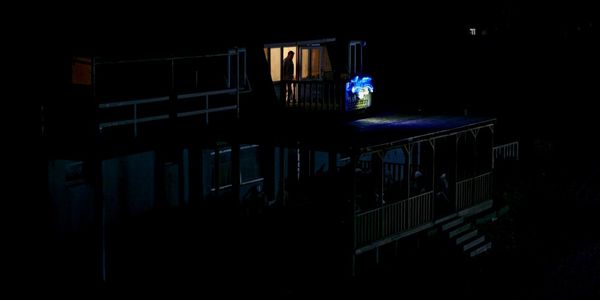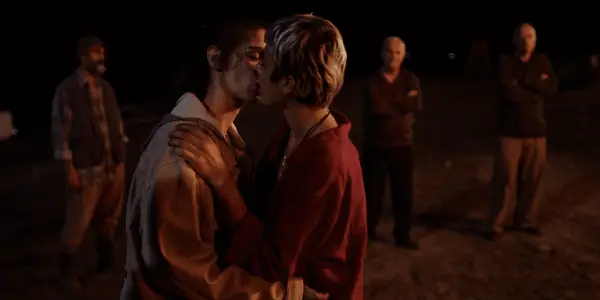WET SAND: The Rebellious Act Of Being Yourself

Soham Gadre is a writer/filmmaker in the Washington D.C. area.…
THIS REVIEW CONTAINS SPOILERS
Many ardent liberal party loyalists like to tell non-white and non-straight people that they should move to conservative-dominated areas in America in order to “flip them blue” for voting purposes. Of course, they won’t take into account the massive adjustment needed to move there. It’s one thing to feel like a fish out of water but it’s another thing to exist with the daily pressure of draconian state laws that don’t allow you to be yourself. This is the heart of Elene Naveriani’s Wet Sand.
Ungrateful Invader
Wet Sand centers on the death of a man named Eliko and his estranged daughter from the city coming to visit for his funeral. There’s a problem though. Eliko was never well-liked and the people of his town, a small town on the Black Sea, felt like he had a superiority complex. He was a connoisseur of wine, a wealthy man who enjoyed the privacy and frequented a nearby beachside bar called “Wet Sand” that was run by his very close acquaintaince Amnon (Gia Agumava) and Amnon’s daughter Fleshka (Megi Kobaladze).

When Eliko’s daughter Moe (Bebe Sesitashvili) arrives in the city, she sticks out like a sore thumb among the locals. Her hair is cut short and dyed, she wears trendy clothing, and quickly feels like she’s unwelcome. The members of the town, at least most of them, look and talk to her like an ungrateful invader.
Liberated Souls
It isn’t explicitly established or stated initially what Moe’s sexual preferences are but from contextual clues – her close comfort in the presence of Fleshka and her standoffishness towards the young hot police officer Alex (Giorgi Tsereteli) – it becomes pretty clear. Sesitashvili gives a tense performance that keeps her character at an emotional distance from everyone in the film and also the audience. There isn’t a great gauge of what she feels towards different people at first but it’s clear that she is uncomfortable coming to her hometown. Many times, rural areas in films are treated as terrifying backwoods hellscapes. One recalls films like Ted Kotcheff’s Wake in Fright and Bogdan Miricā’s Dogs where there is a palpable sense of danger and doom, a phantom force that tells the central characters to leave for their own good before it’s too late. The rural areas of those films feel like a distant planet. But Naveriani’s film doesn’t drop Moe’s hometown with a sinister otherworldly cloak.

After all, for Moe and others like her, any and every place is a place where they are looked at as different. Her hometown isn’t unique in its bigotry though it may be more outspoken about it than the more “progressive” Georgian capital city of Tbilisi. She is met with snide remarks, especially by Dato (Zaal Goguadze), about how she’s a “city girl” and how she never visits. The inferiority complex of the locals stems from a belief that denial of the accepted mold is an automatic pretense. In this town, people tend to ironically keep their distance from one another even though they constantly talk about their “community” as if it’s some sacred thing. Yet, they turn on their own members at the drop of a hat, as they do with Eliko.
Conclusion
Naveriani builds and releases tension in the film by breaking open interior spaces into exterior ones. Whenever Moe is inside a house, there is a melancholy pressure weighing her down. Some houses, like Dato’s, are actively threatening. A dinner scene right after the funeral wake has Moe and Dato finally clashing and Moe marches outside to the beach. It’s the place where Moe and Fleshka have their first kiss. They do this again at the end of the film in front of the people who hate the way they live their lives. The act of kissing in the open, between two women, in a town that denies them their expressions of love is liberating, a breaking away from the rigid structures of the interior spaces which hold bigotry, intolerance, and death. It’s these interior spaces that slowly give way, crumbling at their foundations, to Moe and Fleshka’s freedom to be who they are.
Have you seen Wet Sand? What did you think? Let is know in the comments below!
Wet Sand is currently streaming on MUBI.
Watch Wet Sand
Does content like this matter to you?
Become a Member and support film journalism. Unlock access to all of Film Inquiry`s great articles. Join a community of like-minded readers who are passionate about cinema - get access to our private members Network, give back to independent filmmakers, and more.
Soham Gadre is a writer/filmmaker in the Washington D.C. area. He has written for Hyperallergic, MUBI Notebook, Popula, Vague Visages, and Bustle among others. He also works full-time for an environmental non-profit and is a screener for the Environmental Film Festival. Outside of film, he is a Chicago Bulls fan and frequenter of gastropubs.













